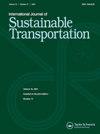利用生命周期效益成本分析对公路和铁路进行比较评估
IF 3.1
3区 工程技术
Q2 ENVIRONMENTAL STUDIES
International Journal of Sustainable Transportation
Pub Date : 2024-10-01
DOI:10.1080/15568318.2024.2411588
引用次数: 0
摘要
运输业对我们的生活质量和环境有着重大影响。与铁路运输相比,公路运输具有更高的环境和社会问题风险。这些问题包括但不限于拥堵、事故、社区隔离和侵占、空气污染、有毒物质排放、水和土壤污染,以及对野生动物生命力的影响。随着全球货运量的激增,对公路运输的严重依赖和铁路的利用不足将证明不足以满足不断增长的需求,并加剧现有的环境和社会问题。因此,交通投资评估必须全面、一致地考虑环境、社会和经济因素。本研究开发了一种生命周期效益成本分析法和一种易于使用的工具,用于捕捉运输基础设施和设备生命周期各个阶段对全国的总体影响。我们对公路和铁路进行了比较,考虑了实际和最大运力,以确定最具成本效益和可持续的投资。结果显示,卡车运输的成本为每千吨英里 370.07 美元,是铁路运输每千吨英里 76.37 美元的 4.85 倍。我们还强调了进一步研究的必要性,以解决数据不可用、度量范围有限和计算方法限制等问题。本文章由计算机程序翻译,如有差异,请以英文原文为准。
Comparative evaluation of highways and railroads using life-cycle benefit-cost analysis
The transportation sector holds a substantial influence on our quality of life and the environment. In contrast to rail transport, road transport carries a heightened risk of environmental and social issues. These include, but are not limited to, congestion, accidents, community segregation and encroachment, air pollution, toxic releases, water and soil pollution, and impacts on wildlife vitality. With the surge in global freight volume, the heavy reliance on road transport and underutilization of railroads will prove inadequate to meet the escalating demand and exacerbate existing environmental and social concerns. Therefore, transportation investment evaluations must comprehensively and consistently consider environmental, social, and economic factors. This study develops a Life-cycle Benefit-Cost Analysis and an accessible tool to capture overall nationwide impacts across various stages of transport infrastructure and equipment life cycles. We compare highways and railroads, considering actual and maximum capacities, to identify the most cost-effective and sustainable investment. Our results show that trucking costs $370.07 per thousand ton-miles, 4.85 times higher than rail at $76.37 per thousand ton-miles. We also highlight further research needed to address the issues of data unavailability, limited metric scope, and computational method limitations.
求助全文
通过发布文献求助,成功后即可免费获取论文全文。
去求助
来源期刊
CiteScore
8.90
自引率
2.60%
发文量
56
期刊介绍:
The International Journal of Sustainable Transportation provides a discussion forum for the exchange of new and innovative ideas on sustainable transportation research in the context of environmental, economical, social, and engineering aspects, as well as current and future interactions of transportation systems and other urban subsystems. The scope includes the examination of overall sustainability of any transportation system, including its infrastructure, vehicle, operation, and maintenance; the integration of social science disciplines, engineering, and information technology with transportation; the understanding of the comparative aspects of different transportation systems from a global perspective; qualitative and quantitative transportation studies; and case studies, surveys, and expository papers in an international or local context. Equal emphasis is placed on the problems of sustainable transportation that are associated with passenger and freight transportation modes in both industrialized and non-industrialized areas. All submitted manuscripts are subject to initial evaluation by the Editors and, if found suitable for further consideration, to peer review by independent, anonymous expert reviewers. All peer review is single-blind. Submissions are made online via ScholarOne Manuscripts.

 求助内容:
求助内容: 应助结果提醒方式:
应助结果提醒方式:


